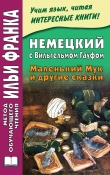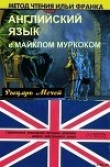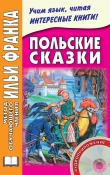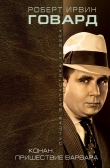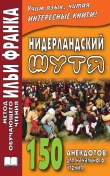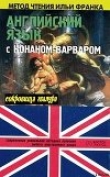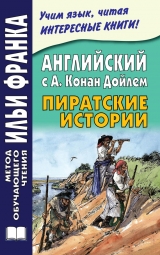
Текст книги "Английский с А. Конан Дойлем. Пиратские истории / A. Conan Doyle. Tales of Pirates"
Автор книги: Артур Конан Дойл
Соавторы: Сергей Андреевский
Жанр:
Иностранные языки
сообщить о нарушении
Текущая страница: 5 (всего у книги 13 страниц) [доступный отрывок для чтения: 5 страниц]

A private venture might be fitted out – and there were many who had a blood-feud with Sharkey – but what could a private venture do? The pirates were numerous and desperate. As to taking Sharkey and his four companions, that, of course, would be easy if they could get at them; but how were they to get at them on a large well-wooded island like La Vache, full of wild hills and impenetrable jungles? A reward was offered to whoever could find a solution, and that brought a man to the front who had a singular plan, and was himself prepared to carry it out.
Stephen Craddock had been that most formidable person, the Puritan gone wrong (этим страшным человеком оказался Стивен Крэддок, сошедший с пути истинного пуританин; to go wrong – сойти с пути истинного). Sprung from a decent Salem family (происходил /он/ из благочестивой сейлемской семьи; to spring – вытекать, бить ключом; происходить, иметь происхождение), his ill-doing seemed to be a recoil from the austerity of their religion (и его дурные поступки, казалось, служили ответной реакцией на аскетизм этой религии; recoil – отскок, откат; ответная реакция /на что-л./), and he brought to vice all the physical strength and energy (он отдавал пороку все свои физические силы и энергию; to bring – приносить, приводить; доставлять) with which the virtues of his ancestors had endowed him (которыми его одарили добродетельные предки). He was ingenious, fearless, and exceedingly tenacious of purpose (он был изобретателен, бесстрашен и необычайно настойчив в /достижении/ цели), so that when he was still young (поэтому, когда он был еще совсем юн) his name became notorious upon the American coast (имя его стало печально известным по всему американскому побережью; to become).

Stephen Craddock had been that most formidable person, the Puritan gone wrong. Sprung from a decent Salem family, his ill-doing seemed to be a recoil from the austerity of their religion, and he brought to vice all the physical strength and energy with which the virtues of his ancestors had endowed him. He was ingenious, fearless, and exceedingly tenacious of purpose, so that when he was still young his name became notorious upon the American coast.
He was the same Craddock who was tried for his life in Virginia (это был тот самый Крэддок, которому грозило пожизненное /заключение/ в Вирджинии; to try – пытаться, делать попытку; судить) for the slaying of the Seminole Chief (за убийство вождя семинолов; chief – глава, руководитель; вождь), and, though he escaped, it was well known (и хотя ему /удалось/ счастливо отделаться, /всем/ было хорошо известно; to escape – совершать побег; спастись, избежать /опасности и т. п./) that he had corrupted the witnesses and bribed the judge (что он подкупил свидетелей и дал взятку судье; to corrupt – портить, развращать; подкупать; to bribe – давать взятку).
Afterwards, as a slaver, and even, as it was hinted, as a pirate (впоследствии /став/ работорговцем и даже, как намекали, пиратом; slave – раб), he had left an evil name behind him in the Bight of Benin (он оставил позади себя дурное имя = он приобрел дурную славу в заливе Бенин; to leave). Finally he had returned to Jamaica with a considerable fortune (в конце концов он вернулся на Ямайку, /имея/ значительное состояние; fortune – удача, везенье; богатство), and had settled down to a life of sombre dissipation (где и поселился, /проводя/ время: «жизнь» в мрачных кутежах; dissipation – рассеяние, расточение; беспутный образ жизни). This was the man, gaunt, austere, and dangerous (это был неприятный, суровый и опасный человек; gaunt – сухопарый; отталкивающий), who now waited upon the Governor with a plan for the extirpation of Sharkey (который теперь ожидал /аудиенции/ у губернатора, /имея свой/ план уничтожения Шарки; extirpation – искоренение; уничтожение, ликвидация).

He was the same Craddock who was tried for his life in Virginia for the slaying of the Seminole Chief, and, though he escaped, it was well known that he had corrupted the witnesses and bribed the judge.
Afterwards, as a slaver, and even, as it was hinted, as a pirate, he had left an evil name behind him in the Bight of Benin. Finally he had returned to Jamaica with a considerable fortune, and had settled down to a life of sombre dissipation. This was the man, gaunt, austere, and dangerous, who now waited upon the Governor with a plan for the extirpation of Sharkey.
Sir Edward received him with little enthusiasm (сэр Эдвард принял его без особого энтузиазма; little – маленький, небольшой), for in spite of some rumours of conversion and reformation (поскольку, несмотря на толки /о том, что Крэддок/ изменился в лучшую сторону; conversion – превращение, изменение; reformation – преобразование, усовершенствование), he had always regarded him as an infected sheep (он всегда считал его паршивой: «зараженной» овцой) who might taint the whole of his little flock (которая может испортить все его небольшое стадо; taint – пятно; to taint – окрашивать, влиять, придавать оттенок; заражать; портить). Craddock saw the Governor’s mistrust under his thin veil of formal and restrained courtesy (Крэддок заметил недоверие губернатора под тонкой вуалью официальной и сдержанной учтивости).
“You’ve no call to fear me, sir,” said he (вам нет нужды опасаться меня, сэр, – сказал он; call – крик, зов; необходимость, нужда); “I’m a changed man from what you’ve known (/сейчас/ я сильно отличаюсь от того человека, которого вы знали; changed man – человек, чьи характер и поведение сильно изменились, особ. в лучшую сторону). I’ve seen the light again, of late (недавно я вновь увидел свет; of late – недавно, в недалеком прошлом), after losing sight of it for many a black year (после того как потерял способность видеть его многие = долгие темные годы; sight – зрение). It was through the ministration of the Rev. John Simons, of our own people (это /произошло/ благодаря помощи преподобного Джона Саймонса и прихожан нашей /церкви/; people – нация, народ; прихожане). Sir, if your spirit should be in need of quickening (сэр, если вам потребуется укрепить дух: «если ваш дух будет нуждаться в укреплении»; to quicken – ускорять; оживлять), you would find a very sweet savour in his discourse (вы найдете много приятного и интересного в его проповедях; sweet – сладкий /о вкусе/; благозвучный; savour – особый вкус, запах; интерес /к чему-л./; discourse – серьезный разговор, беседа; лекция, речь).”

Sir Edward received him with little enthusiasm, for in spite of some rumours of conversion and reformation, he had always regarded him as an infected sheep who might taint the whole of his little flock. Craddock saw the Governor’s mistrust under his thin veil of formal and restrained courtesy.
“You’ve no call to fear me, sir,” said he; “I’m a changed man from what you’ve known. I’ve seen the light again, of late, after losing sight of it for many a black year. It was through the ministration of the Rev. John Simons, of our own people. Sir, if your spirit should be in need of quickening, you would find a very sweet savour in his discourse.”
The Governor cocked his Episcopalian nose at him (губернатор задрал перед ним свой нос /приверженца/ епископальной церкви; to cock – петушиться, вести себя вызывающе; поднимать, задирать).
“You came here to speak of Sharkey, Master Craddock (вы пришли сюда, чтобы поговорить о Шарки, господин Крэддок),” said he.
“The man Sharkey is a vessel of wrath (этот человек – Шарки – сосуд гнева),” said Craddock. “His wicked horn has been exalted over long (его нечестивый рог слишком высоко вознесся), and it is borne in upon me (и мне было откровение; to be borne in upon smb. – доходить до чьего-л. понимания) that if I can cut him off and utterly destroy him (что если я смогу его срубить и полностью уничтожить), it will be a goodly deed (это станет благим деянием), and one which may atone for many backslidings in the past (которое сможет искупить многие отступления от веры в прошлом; back – назад; to slide – скользить, соскальзывать). A plan has been given to me (мне был вручен этот план; to give) whereby I may encompass his destruction (при помощи которого я могу уничтожить Шарки: «осуществить его уничтожение»; to encompass – окружать; выполнять, осуществлять).”

The Governor cocked his Episcopalian nose at him.
“You came here to speak of Sharkey, Master Craddock,” said he.
“The man Sharkey is a vessel of wrath,” said Craddock. “His wicked horn has been exalted over long, and it is borne in upon me that if I can cut him off and utterly destroy him, it will be a goodly deed, and one which may atone for many backslidings in the past. A plan has been given to me whereby I may encompass his destruction.”
The Governor was keenly interested (губернатор чрезвычайно заинтересовался; keenly – остро, тонко; заинтересованно; keen – острый), for there was a grim and practical air about the man’s freckled face (поскольку покрытое веснушками лицо посетителя имело выражение неподдельной решительности; grim – жестокий; решительный, суровый; air – воздух, атмосфера; внешний вид; practical – практический; действительный, подлинный; freckles – веснушки) which showed that he was in earnest (что свидетельствовало о серьезности его /намерений/; in earnest – серьезный; to show – показывать; проявлять, выказывать /эмоции/). After all, he was a seaman and a fighter (в конце концов он был моряком и воином; to fight – сражаться, драться), and, if it were true that he was eager to atone for his past (и если его желание искупить /грехи/ прошлого было истинным; to be eager – гореть желанием), no better man could be chosen for the business (то лучшего человека для этого дела не выбрать = не сыскать; to choose).
“This will be a dangerous task, Master Craddock (это будет опасным = трудным делом, господин Крэддок; danger – опасность; task – задание, задача; дело),” said he.
“If I meet my death at it (если я при этом встречу свою смерть), it may be that it will cleanse the memory of an ill-spent life (тогда, возможно, это сотрет: «очистит» воспоминания о дурно прожитой жизни; to spend – тратить, расходовать; проводить /время/). I have much to atone for (мне многое нужно искупить).”
The Governor did not see his way to contradict him (губернатор не видел причин возражать ему; way – путь, дорога; способ, метод).
“What was your plan?” he asked (и каков же ваш план? – спросил он).

The Governor was keenly interested, for there was a grim and practical air about the man’s freckled face which showed that he was in earnest. After all, he was a seaman and a fighter, and, if it were true that he was eager to atone for his past, no better man could be chosen for the business.
“This will be a dangerous task, Master Craddock,” said he.
“If I meet my death at it, it may be that it will cleanse the memory of an ill-spent life. I have much to atone for.”
The Governor did not see his way to contradict him.
“What was your plan?” he asked.
“You have heard that Sharkey’s barque, the Happy Delivery, came from this very port of Kingston (вы, /наверное/, слышали, что барк Шарки «Счастливое избавление» портом приписки имел именно Кингстон; to come from – происходить, быть родом из)?”
“It belonged to Mr. Codrington, and it was taken by Sharkey (он принадлежал мистеру Кодрингтону и был захвачен Шарки), who scuttled his own sloop and moved into her because she was faster,” said Sir Edward (который потопил собственный шлюп и перебрался на барк, потому что тот был быстрее; to scuttle – делать отверстия в борту или днище корабля; затапливать судно, открыв кингстоны).
“Yes; but it may be that you have never heard (да, но, вероятно, вы никогда не слышали) that Mr. Codrington has a sister ship, the White Rose (что у мистера Кодрингтона есть «Белая роза» – точно такой же корабль; sister – сестринский, связанный родственными узами; однотипный), which lies even now in the harbor (который сейчас стоит в гавани), and which is so like the pirate (и который так похож на пиратский), that, if it were not for a white paint line, none could tell them apart (что, если бы не полоса, /нанесенная/ белой краской, никто не смог бы их отличить; to tell apart – отличать, различать).”

“You have heard that Sharkey’s barque, the Happy Delivery, came from this very port of Kingston?”
“It belonged to Mr. Codrington, and it was taken by Sharkey, who scuttled his own sloop and moved into her because she was faster,” said Sir Edward.
“Yes; but it may be that you have never heard that Mr. Codrington has a sister ship, the White Rose, which lies even now in the harbor, and which is so like the pirate, that, if it were not for a white paint line, none could tell them apart.”
“Ah! and what of that?” asked the Governor keenly (ага! и что из того? – оживившись спросил губернатор), with the air of one who is just on the edge of an idea (с видом человека, находящегося на грани озарения; edge – кромка, край; idea – мысль; понимание).
“By the help of it this man shall be delivered into our hands (при помощи этого этот человек будет доставлен в наши руки = благодаря этому сходству пират Шарки попадет нам в руки).”
“And how (а как)?”
“I will paint out the streak upon the White Rose (я закрашу полоску на «Белой розе»), and make it in all things like the Happy Delivery (и во всех отношениях сделаю ее похожей на «Счастливое избавление»). Then I will set sail for the Island of La Vache (затем я возьму курс: «поставлю» на остров Ла-Ваш; to set sail – ставить парус; to set sail for /a port/ – плыть в /какой-л. порт/), where this man is slaying the wild oxen (где этот человек убивает сейчас диких быков). When he sees me he will surely mistake me for his own vessel (когда он меня увидит, то обязательно примет за свое собственное судно; to mistake – ошибаться; to mistake for – принять кого-л. за другого) which he is awaiting (/подхода/ которого он ожидает), and he will come on board to his own undoing (и поднимется на борт, /чтобы встретить/ свою погибель).”

“Ah! and what of that?” asked the Governor keenly, with the air of one who is just on the edge of an idea.
“By the help of it this man shall be delivered into our hands.”
“And how?”
“I will paint out the streak upon the White Rose, and make it in all things like the Happy Delivery. Then I will set sail for the Island of La Vache, where this man is slaying the wild oxen. When he sees me he will surely mistake me for his own vessel which he is awaiting, and he will come on board to his own undoing.”
It was a simple plan, and yet it seemed to the Governor that it might be effective (план был прост, но губернатору все же казалось, что он может оказаться действенным). Without hesitation he gave Craddock permission to carry it out (без колебаний он дал Крэддоку позволение воплотить его в жизнь; to carry out – выполнять), and to take any steps he liked (и предпринять любые меры, которые тот сочтет необходимыми: «любые шаги, которые ему понравятся») in order to further the object which he had in view (чтобы достичь цели, к которой тот стремился; to further – продвигать; способствовать осуществлению; object – предмет; цель; to have in view – иметь в виду). Sir Edward was not very sanguine (/однако/ сэр Эдвард не был слишком оптимистичен; sanguine – кроваво-красный; оптимистичный, уверенный в успехе), for many attempts had been made upon Sharkey (потому что уже было предпринято множество попыток /поймать/ Шарки; to make – делать; совершать, выполнять /какие-л. действия/), and their results had shown (и их результаты показали; to show), that he was as cunning as he was ruthless (что он = Шарки был столь же хитер, как и жесток). But this gaunt Puritan with the evil record was cunning and ruthless also (но этот суровый пуританин с дурной биографией тоже был хитер и жесток; evil – злой, дурной; record – запись; биография, досье).

It was a simple plan, and yet it seemed to the Governor that it might be effective. Without hesitation he gave Craddock permission to carry it out, and to take any steps he liked in order to further the object which he had in view. Sir Edward was not very sanguine, for many attempts had been made upon Sharkey, and their results had shown, that he was as cunning as he was ruthless. But this gaunt Puritan with the evil record was cunning and ruthless also.
The contest of wits between two such men as Sharkey and Craddock (состязание в хитрости между двумя такими людьми, как Шарки и Крэддок; wit – ум, разум; остроумие) appealed to the Governor’s acute sense of sport (разбудило в губернаторе его обостренное чувство азарта; to appeal – взывать; привлекать, притягивать; acute – острый; сильный, крайний; sport /зд./ – азартная игра), and though he was inwardly convinced (и хотя внутренне он был убежден /в том/) that the chances were against him (что /все/ шансы против него), he backed his man with the same loyalty (он сделал ставку на своего человека с той же непоколебимостью: «преданностью»; to back – поддерживать; держать пари, ставить на) which he would have shown to his horse or his cock (которую он выказал бы по отношению к своей лошади или /бойцовому/ петуху).
Haste was, above all things, necessary (прежде всего нужно было поспешить: «поспешность была необходима»), for upon any day the careening might be finished (поскольку в любой из дней кренгование могло быть закончено), and the pirates out at sea once more (и пираты снова вышли бы в море).

The contest of wits between two such men as Sharkey and Craddock appealed to the Governor’s acute sense of sport, and though he was inwardly convinced that the chances were against him, he backed his man with the same loyalty which he would have shown to his horse or his cock.
Haste was, above all things, necessary, for upon any day the careening might be finished, and the pirates out at sea once more.
But there was not very much to do (но дел было совсем немного), and there were many willing hands to do it (а желающих помочь сделать их, /наоборот/, предостаточно; willing – охотно делающий /что-л./; hand – рука /кисть/; помощник), so the second day saw the White Rose beating out for the open sea (так что на следующий день «Белая роза» уже выходила в открытое море; to see – видеть, смотреть; быть временем совершения чего-л.; to beat out – плыть против ветра). There were many seamen in the port (в порту было много моряков) who knew the lines and rig of the pirate barque (которые знали очертания/линии и оснастку пиратского барка), and not one of them could see the slightest difference in this counterfeit (и ни один из них не смог заметить ни малейшего отличия в этой подделке; slight – легкий, незначительный). Her white side line had been painted out (белая полоса на его боку была закрашена), her masts and yards were smoked (мачты и реи закопчены; yard – ярд /мера длины/; рея /мор./; to smoke – дымить/ся/; коптить), to give them the dingy appearance of the weather-beaten rover (чтобы придать судну вид бывалого /морского/ бродяги; dingy – выцветший, блеклый; потрепанный; weather-beaten – пострадавший от непогоды; видавший виды), and a large diamond shaped patch was let into her fore-topsail (а на его фор-марселе поставили огромную заплату в форме ромба; diamond – алмаз; ромб; to let into – вставить).

But there was not very much to do, and there were many willing hands to do it, so the second day saw the White Rose beating out for the open sea. There were many seamen in the port who knew the lines and rig of the pirate barque, and not one of them could see the slightest difference in this counterfeit. Her white side line had been painted out, her masts and yards were smoked, to give them the dingy appearance of the weather-beaten rover, and a large diamond shaped patch was let into her fore-topsail.
Her crew were volunteers (команда «Белой розы» состояла из добровольцев), many of them being men who had sailed with Stephen Craddock before (многие из них плавали со Стивеном Крэддоком прежде) – the mate, Joshua Hird, an old slaver, had been his accomplice in many voyages (помощник капитана Джошуа Хирд, старый работорговец, был его правой рукой во многих плаваниях; mate – товарищ, напарник; помощник капитана /мор./; accomplice – сообщник, соучастник), and came now at the bidding of his chief (приехал и теперь по просьбе своего /бывшего/ вожака).
The avenging barque sped across the Caribbean Sea (барк-мститель мчался по Карибскому морю; to speed – двигаться на высокой скорости), and, at the sight of that patched topsail (и при виде его заплатанного топселя), the little craft which they met flew left and right (маленькие суденышки, встречавшиеся /на пути/, разлетались во все стороны: «влево и вправо»; to fly) like frightened trout in a pool (как испуганная форель в озере). On the fourth evening Point Abacou bore five miles to the north and east of them (вечером на четвертый день в пяти милях к северо-востоку от них показался мыс Абаку; to bear – носить, нести; находиться /где-л./).

Her crew were volunteers, many of them being men who had sailed with Stephen Craddock before – the mate, Joshua Hird, an old slaver, had been his accomplice in many voyages, and came now at the bidding of his chief.
The avenging barque sped across the Caribbean Sea, and, at the sight of that patched topsail, the little craft which they met flew left and right like frightened trout in a pool. On the fourth evening Point Abacou bore five miles to the north and east of them.
On the fifth day they were at anchor in the Bay of Tortoises at the Island of La Vache (на пятый день они уже бросили якорь в Бухте черепах на острове Ла-Ваш), where Sharkey and his four men had been hunting (где охотились Шарки и его четверо матросов). It was a well-wooded place, with the palms and underwood (местность густо покрывала растительность с пальмовыми деревьями и подлеском; well-wooded – лесистый; place – место, занятое пространство) growing down to the thin crescent of silver sand which skirted the shore (спускавшимися к тонкой = узкой /полосе/ серебряного песка, полумесяцем окаймлявшей берег; to grow – произрастать, расти; down – вниз; skirt – юбка; полоса, кромка; to skirt – окружать, окаймлять). They had hoisted the black flag and the red pennant (они подняли черный флаг и красный вымпел; pennant – флажок /часто с узким длинным полотнищем/; вымпел /мор./), but no answer came from the shore (но с берега никакого ответа не было). Craddock strained his eyes (Крэддок напрягал зрение; eye – глаз), hoping every instant to see a boat shoot out to them (надеясь каждое мгновение увидеть отчаливающую им навстречу шлюпку; to shoot out – выскочить, вылететь) with Sharkey seated in the sheets (с Шарки, сидящим у шкотов; sheet – простыня; шкот /трос для управления парусами/).

On the fifth day they were at anchor in the Bay of Tortoises at the Island of La Vache, where Sharkey and his four men had been hunting. It was a well-wooded place, with the palms and underwood growing down to the thin crescent of silver sand which skirted the shore. They had hoisted the black flag and the red pennant, but no answer came from the shore. Craddock strained his eyes, hoping every instant to see a boat shoot out to them with Sharkey seated in the sheets.
But the night passed away, and a day and yet another night (но прошла ночь, за ней – день и еще другая ночь), without any sign of the men whom they were endeavouring to trap (без каких-либо признаков людей, которых они пытались заманить в ловушку). It looked as if they were already gone (/все/ выглядело так, будто они = пираты уже покинули /остров/; to be gone – исчезнуть, пропасть).
On the second morning Craddock went ashore in search of some proof (на утро второго дня Крэддок высадился на берег чтобы убедиться: «поискать доказательства») whether Sharkey and his men were still upon the island (находится ли еще Шарки со своими людьми на острове). What he found reassured him greatly (то, что он обнаружил, не оставило /ему в этом/ никаких сомнений; to reassure – уверять, убеждать; greatly – очень, весьма). Close to the shore was a boucan of green wood (недалеко от берега стояла коптильня из свежесрубленных бревен; boucan /фр./ – коптильня), such as was used for preserving the meat (какую используют при заготовке мяса), and a great store of barbecued strips of ox-flesh was hung upon lines all round it (а повсюду вокруг нее на линях были развешены полоски зажаренного бизоньего мяса; to hang; line – линия, полоса; веревка, линь /мор./).

But the night passed away, and a day and yet another night, without any sign of the men whom they were endeavouring to trap. It looked as if they were already gone.
On the second morning Craddock went ashore in search of some proof whether Sharkey and his men were still upon the island. What he found reassured him greatly. Close to the shore was a boucan of green wood, such as was used for preserving the meat, and a great store of barbecued strips of ox-flesh was hung upon lines all round it.
The pirate ship had not taken off her provisions (пиратский корабль еще не забрал свою провизию), and therefore the hunters were still upon the island (и следовательно, охотники до сих пор находились на острове).
Why had they not shown themselves (почему же они не показывались; to show)? Was it that they had detected that this was not their own ship (не обнаружили ли они, что это не их корабль)? Or was it that they were hunting in the interior of the island (а может, они охотились в глубине острова; interior – внутренняя часть), and were not on the lookout for a ship yet (и еще не ждали /прихода/ корабля; lookout – наблюдение; to be on the lookout for – ожидать, искать /кого-л., что-л./)? Craddock was still hesitating between the two alternatives (Крэддок все еще не знал, какой из двух вариантов верный: «все еще колебался между двумя альтернативами»), when a Carib Indian came down with information (когда индеец-караиб принес /нужные ему/ сведения; to come down – приходить, приезжать). The pirates were in the island, he said (пираты находятся на острове, сказал он), and their camp was a day’s march from the sea (и до их лагеря один день пути; march – движение вперед, марш).

The pirate ship had not taken off her provisions, and therefore the hunters were still upon the island.
Why had they not shown themselves? Was it that they had detected that this was not their own ship? Or was it that they were hunting in the interior of the island, and were not on the lookout for a ship yet? Craddock was still hesitating between the two alternatives, when a Carib Indian came down with information. The pirates were in the island, he said, and their camp was a day’s march from the sea.
They had stolen his wife (они отобрали у него жену; to steal – воровать, красть; увести), and the marks of their stripes were still pink upon his brown back (а отметины, сделанные их палками, все еще розовели на его коричневой спине; stripe – след удара от хлыста, прута и т. п.). Their enemies were his friends (их враги – его друзья), and he would lead them to where they lay (и он отведет их к пиратскому лагерю: «туда, где они расположились»; to lie – лежать; находиться, быть расположенным).
Craddock could not have asked for anything better (ничего лучшего Крэддок не мог бы и пожелать; to ask for – просить, требовать); so early next morning, with a small party armed to the teeth (и вот ранним утром следующего дня, с небольшим вооруженным до зубов отрядом), he set off under the guidance of the Carib (он выступил в поход, ведомый проводником-караибом; to set off – отправляться /в путь/; under the guidance – под руководством; to guide – вести, указывать путь). All day they struggled through brushwood and clambered over rocks (весь день они продирались сквозь заросли и карабкались по скалам), pushing their way further and further into the desolate heart of the island (продвигаясь все дальше и дальше в безлюдную глубь острова; to push – толкать, пихать; проталкиваться, протискиваться; desolate – одинокий, оставленный всеми, заброшенный; heart – сердце; сердцевина, центр).

They had stolen his wife, and the marks of their stripes were still pink upon his brown back. Their enemies were his friends, and he would lead them to where they lay.
Craddock could not have asked for anything better; so early next morning, with a small party armed to the teeth, he set off under the guidance of the Carib. All day they struggled through brushwood and clambered over rocks, pushing their way further and further into the desolate heart of the island.
Here and there they found traces of the hunters (то тут, то там они находили следы охотников), the bones of a slain ox, or the marks of feet in a morass (кости убитого быка или отпечатки ног на болоте; to slay), and once, towards evening, it seemed to some of them (а однажды, ближе к вечеру, некоторым из них показалось) that they heard the distant rattle of guns (что они слышат отдаленный треск ружей).
That night they spent under the trees (ту ночь они провели под деревьями; to spend – тратить; проводить /время/), and pushed on again with the earliest light (и вновь продолжили путь, чуть забрезжил рассвет: «с самым ранним светом»; to push on – толкать вперед, проталкивать; спешить; to push – толкать). About noon they came to the huts of bark (около девяти они подошли к хижинам из древесной коры), which, the Carib told them, were the camp of the hunters (которые и были, как сказал караиб, лагерем охотников), but they were silent and deserted (но они были безмолвны и пусты).

Here and there they found traces of the hunters, the bones of a slain ox, or the marks of feet in a morass, and once, towards evening, it seemed to some of them that they heard the distant rattle of guns.
That night they spent under the trees, and pushed on again with the earliest light. About noon they came to the huts of bark, which, the Carib told them, were the camp of the hunters, but they were silent and deserted.
No doubt their occupants were away at the hunt and would return in the evening (нет сомнений, их обитатели ушли на охоту и вернутся вечером), so Craddock and his men lay in ambush in the brushwood around them (так что Крэддок и его люди устроили засаду в кустарнике вокруг лагеря; to lie – лежать; находиться). But no one came, and another night was spent in the forest (но никто не появился: «не пришел», и еще одна ночь прошла в лесу в пустых ожиданиях; to spend – тратить, расходовать; расточать, тратить впустую /силы, время/). Nothing more could be done, and it seemed to Craddock (делать больше было нечего, и Крэддок подумал; to seem – казаться, представляться) that after the two days’ absence it was time that he returned to his ship once more (что после двухдневного отсутствия пришло время снова вернуться на корабль).


